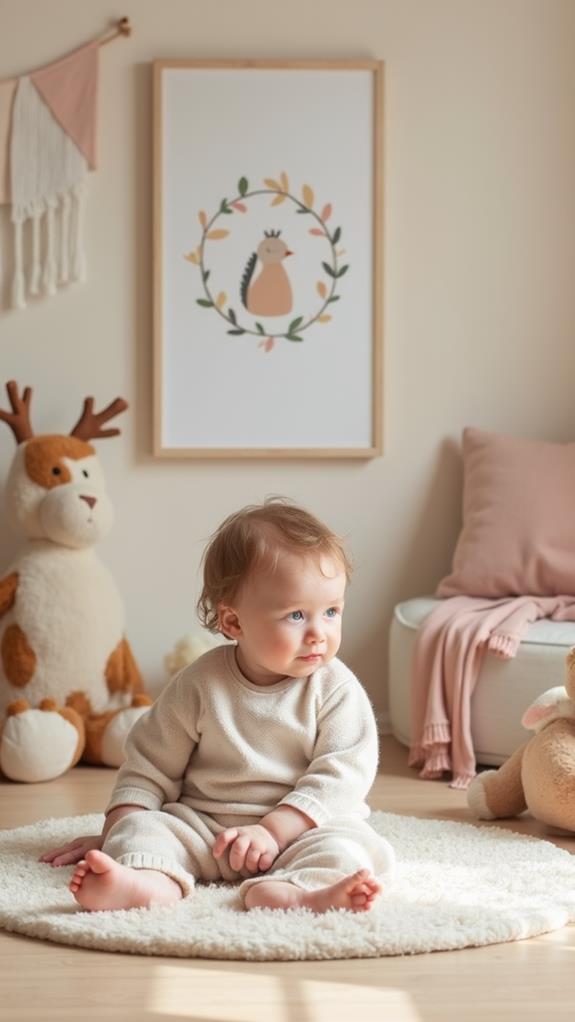Disciplining your sensitive toddler? It’s all about kindness, not tough love. These little humans feel emotions like rollercoasters, so your gentle discipline can really make a difference. Try creating a calm-down corner for those meltdowns—it’s like their own emotional safety net! Use positive reinforcement to celebrate good behavior with praise like, “Great job sharing!” or “You’re a superstar for cleaning up!” Setting clear, simple boundaries helps them know what’s what without turning your home into a chaotic circus. And hey, don’t forget to connect with them using eye contact and a sprinkle of humor. There’s a lot more to investigate here!
Key Takeaways
- Use gentle discipline techniques to build trust and support emotional regulation, avoiding harsh punishments that can instill fear.
- Create a calm-down corner for sensitive children to regroup and manage overwhelming emotions effectively.
- Set clear and consistent boundaries to help sensitive toddlers navigate their environment and understand acceptable behavior.
- Employ positive reinforcement by praising good behavior, which encourages responsibility and boosts self-esteem.
- Communicate effectively through active listening, emotional validation, and simple language to strengthen connection and understanding.
Understanding Sensitive Children

Understanding sensitive children is essential for effective toddler discipline. You’ve probably noticed that your little one reacts differently to situations. Those emotional triggers can turn a simple trip to the grocery store into a full-blown meltdown. It’s like they’ve got a sixth sense for spotting overstimulation!
Sensitive kids often have unique sensory processing styles. While some kids might thrive in a lively environment, yours might feel overwhelmed by the noise and lights. It’s like they’re wearing a superhero cape that makes every little thing feel ten times stronger.
So, when they get upset, it’s not just a tantrum; it’s a sensory overload! Recognizing these quirks is key. You don’t want to discipline in a way that feels like throwing gasoline on a fire. Instead, you can help them manage their emotions.
Maybe create a calm-down corner with some cozy pillows or soft toys. This way, when they hit those emotional triggers, they’ve got a safe space to regroup. Remember, it’s all about tuning into their needs and helping them feel secure in their own little world.
After all, you’re their greatest ally in this parenting journey!
The Importance of Gentle Discipline
Gentle discipline plays an essential role in nurturing sensitive children. When you use gentle approaches, you’re not just avoiding the yelling and time-outs; you’re building a bridge of trust with your little one. Sensitive kids feel everything deeply, and harsh discipline can leave them feeling scared or misunderstood. Nobody wants that!
Think of emotional regulation as a skill, like riding a bike. You wouldn’t toss your child onto a bike without training wheels and expect them to zoom off, right? Instead, you guide them, encouraging balance and confidence. Gentle discipline does the same thing. It helps your child learn to manage their feelings without feeling overwhelmed.
You might feel tempted to raise your voice when they throw a tantrum over a cookie. But instead, take a deep breath. Remind yourself that your calmness teaches them how to steer through their own emotions.
You want them to learn that feelings are okay, but how to express those feelings is what matters.
Positive Reinforcement Techniques

Positive reinforcement is a powerful tool that can change your toddler’s behavior and enhance their confidence. Instead of focusing on what your little one does wrong, let’s celebrate what they do right! You’ll be amazed at how a little praise can go a long way. Try using these praise strategies and reward systems to keep the good vibes flowing.
| Behavior | Praise Strategy |
|---|---|
| Sharing toys | “Wow, you’re such a great friend!” |
| Cleaning up their mess | “You’re a superstar for helping!” |
| Listening well | “You’re so smart for following directions!” |
| Trying new foods | “Yummy! You’re brave for tasting that!” |
Setting Clear Boundaries
Setting clear boundaries is crucial for helping sensitive toddlers feel secure and understood. Think of boundaries as the safety net for your little acrobat. Without them, they might tumble into chaos—like a puppy on roller skates! You need to provide boundary examples that are simple and straightforward. For instance, tell them it’s not okay to hit or to throw toys. Instead, suggest they can express feelings with words or find a soft toy to throw.
But here’s the kicker: boundary consistency is key. If you say no today but change your mind tomorrow, your toddler will be more confused than a cat in a dog park. Stick to your rules like glue! This doesn’t mean you can’t be flexible when needed; just make sure your little one knows what to expect.
Boundaries help them traverse their world, like a map for their emotions. So, set those limits with love and a sprinkle of humor. You might even find yourself chuckling when they test those boundaries.
Just remember, you’re building a foundation for their future, one playful boundary at a time!
Communicating Effectively With Your Toddler

When it comes to communicating effectively with your toddler, tuning in to their feelings is essential. You know they can be like tiny tornadoes, swirling with emotions one minute and calm the next. So, how do you keep up?
Start with active listening. Get down to their level, make eye contact, and show them you’re really there. It’s like magic!
When your little one spills their juice and bursts into tears, instead of saying, “It’s no big deal,” try offering emotional validation. Acknowledge their feelings by saying, “I can see you’re really upset about the juice. That’s okay!” This helps them feel heard and understood.
Remember, it’s not about solving every problem but about connecting. Use simple words and be patient. Your toddler may not understand everything you say, but they’ll pick up on your tone and body language.
And hey, don’t forget to add a sprinkle of humor! A silly face or a funny dance can lighten the mood and show them you’re on their team.
Conclusion
So, remember, gentle discipline is your best friend when it comes to raising sensitive kiddos. Imagine this: little Timmy, who cries every time his block tower topples over. Instead of a timeout, you cheer him on, saying, “Let’s rebuild it together!” He learns resilience and feels supported. By using positive reinforcement and clear boundaries, you’re not just a parent; you’re a superhero in disguise. Keep it cool, keep it kind, and you’ll both steer through this parenting journey just fine!
Join our list
Subscribe to our mailing list and get interesting stuff and updates to your email inbox.

